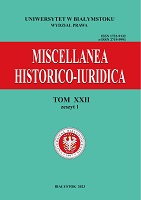Rzymski proces cywilny i rzymski proces karny Rzymian w ujęciu ks. prof. Stanisława Płodzienia (uwagi na marginesie maszynopisu BU KUL 1443A)
Roman Civil Trial and Roman Criminal Trial as Seen by Rev. Prof. Stanisław Płodzień (Remarks on the Margin of the Typescript of BU KUL 1443A)
Author(s): Maciej JońcaSubject(s): History of Law, Criminal Law, Social history, Ancient World, Roman law
Published by: Wydawnictwo Uniwersytetu w Białymstoku
Keywords: Stanisław Płodzień; Roman criminal trial; Roman civil trial; KUL University Library;
Summary/Abstract: The Special Collections Department of the University Library of the Catholic University of Lublin preserves the legacy of the Podlasie-born Romanist Rev. Prof. Stanisław Płodzień. The author taught Roman and Canon Law at the Catholic University of Lublin in the 1950s and early 1960s. However, his promising career was interrupted by his sudden death in 1962. Among the unpublished materials he left behind is a script prepared for first-year students of canon law, entitled „The Roman Civil Trial”. This is a valuable find, since in the 19th and 20th centuries only two monographs on the Roman civil procedure were published in Polish. An analysis of the script shows that its author drew mostly on Leopold Wenger’s monograph „Institutionen des römischen Zivilprozessrechts”. It is from him that he took the idea of devoting a separate discussion to the differences between Roman civil trials and their criminal and administrative proceedings. The text included a subsection entitled “The Relationship between the Roman Civil Trial and Criminal and Administrative proceedings”. The author presented the peculiarities of all three types of proceedings in a factual manner, emphasizing that certain contemporary categories had already been contemplated by the Romans. Particularly noteworthy is the departure from the concept of dividing law into public and private based on the so-called criterion of benefit (utilitas). Rev. Płodzień emphasizes that the concept of state interest in Roman times was as vague as it is today. The narrative makes subtle use of modern civilist terminology.
Journal: Miscellanea Historico-Iuridica
- Issue Year: 22/2023
- Issue No: 1
- Page Range: 419-434
- Page Count: 16
- Language: Polish

